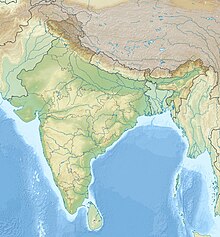The Sanjeli inscriptions consist in three copperplate charters found in Sanjeli in northern Gujarat, dated to 499 CE, 502 CE and 515 CE respectively: they are the "Sanjeli Charter of the Merchants", "Sanjeli Charter of Bhūta" and the "Sanjeli Charter of Mātṛdāsa".[2] The copperplates mention the rule of Alchon Huns king Toramana in the area, as mahārājādhirājaśrī toramāṇe ("Great King of Kings Toramana", in the Sanjeli Charter of the Merchants).[3][4]

The first copperplate refers to the 3rd year of the reign of Toramana, and describes pious gifts made by merchants in the area of Vadrapali in the district of Sivabhagapura.[3]
The copperplates also describes how the local king Maharaja Bhuta in Sanjeli was made Governor (visayapati)[5] of the district of Sivabhagapura (northern Gujarat) by the grace of Toramana.[3][1]
The Sanjeli inscriptions indicate that Toramana penetrated at least as far as northern Gujarat,[6] and possibly to the trading port of Bharukaccha.[3]
References
edit- ^ a b Hans Bakker 24th Gonda lecture
- ^ Ray, Krishnendu (2003). "MATERIAL MELIEU OF A WESTERN INDIAN VAISNAVA TEMPLE-CLUSTER: GLEANINGS FROM SANJELI COPPER PLATES (AD 499-515 AD)". Proceedings of the Indian History Congress. 64: 255. ISSN 2249-1937.
- ^ a b c d The World of the Skandapurāṇa by Hans Bakker p.34
- ^ "Siddham. The Asian Inscription Database IN00103 Sanjeli Charter of the Merchants".
- ^ Indian Epigraphical Glossary by Dineschandra Sircar p.378
- ^ Salomon, Richard (1989). "New Inscriptional Evidence For The History Of The Aulikaras of Mandasor". Indo-Iranian Journal. 32 (1): 28. doi:10.1163/000000089790082971. ISSN 0019-7246. JSTOR 24654606.
